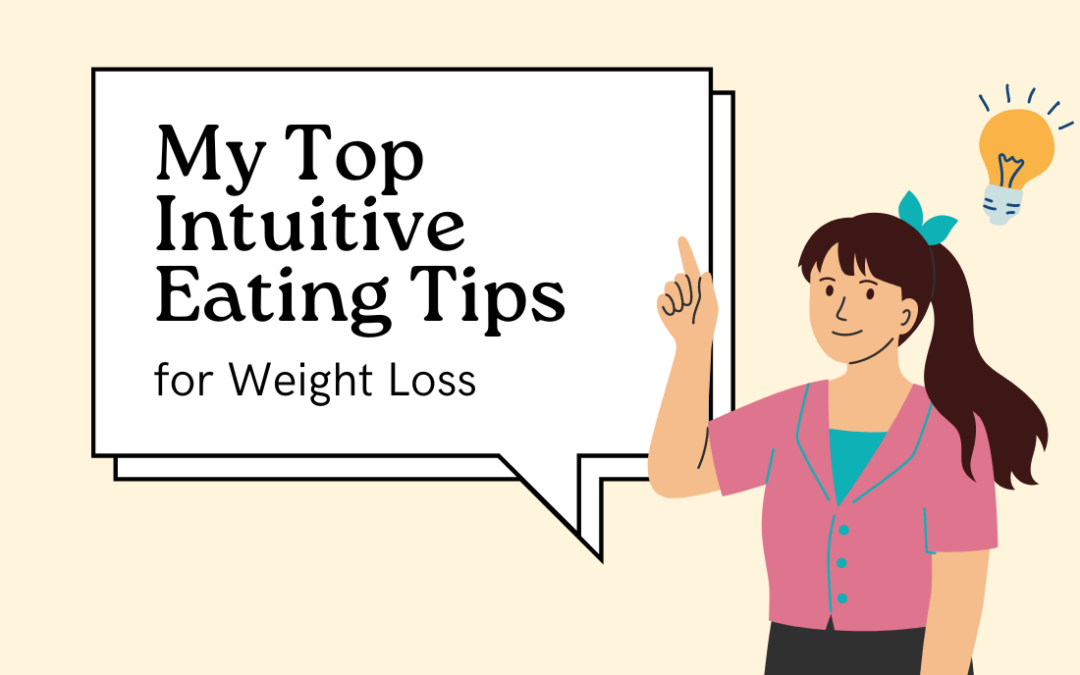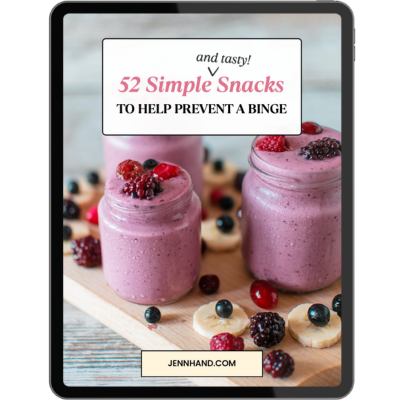Written by Jenn Hand, Binge Eating Coach, Holistic Nutritionist, Board Certified Health Coach, NBC-HWC
In the world of weight loss and diet culture, we are inundated with fad diets and quick fixes promising instant results.
But amidst the chaos, there’s a quieter, more sustainable approach that’s been steadily gaining momentum the last few years: intuitive eating. (I also call this “normal” eating!)
When I was healing my own complex relationship with food, I wanted to eat normally, listen to my body AND be at a comfortable weight.
I didn’t want to sacrifice never losing weight to have food freedom. In my work, I believe in both. I believe you can learn to listen to your body and support your body to be at a comfortable weight.
How, you ask?
Let’s dive in!
Table of Contents
- What Is Intuitive Eating?
- Intuitive Eating for Weight Loss
- But Should Intuitive Eating Even Focus on Weight Loss?
- Is Losing Weight Even Possible without Dieting?
- How I Approach Intuitive Eating for Weight Loss
- Isn’t Intuitive Eating Just Another Diet?
- Causes of Weight Gain and How Intuitive Eating Can Help
- Main Principles of Intuitive Eating
- How to Practice Intuitive Eating
- How to Create an Effective Intuitive Eating Plan
- Yes, You Might Gain Weight When You First Start Intuitive Eating
- Hybrid Intuitive Eating: Structure + Your Intuition
- Simple Steps for Intuitive Eating
- How Body Acceptance Plays into Intuitive Eating
- How Intuitive Eating Can Help You Stop Emotional Eating
- Is Intuitive Eating a Good Way to Stop Yo-Yo Dieting?
- Will Intuitive Eating Stop the Binge and Restrict Cycle?
- Alternatives to Intuitive Eating for Weight Loss
- Should You Work with an Intuitive Eating Counselor or Coach?
- Common Questions about Intuitive Eating for Weight Loss
What Is Intuitive Eating?
At its core, eating intuitively is about tuning into your body’s natural hunger and fullness cues, and eating in a way that honors your physical and emotional needs without strict rules or restrictions.
It’s about cultivating a deeper connection with food, learning to trust your body, and breaking free from the diet mentality. It’s about freedom AND structure, permission AND boundaries.
Intuitive Eating for Weight Loss
Contrary to popular belief, intuitive eating can be a powerful tool for long term sustainable weight loss.
It’s not a quick fix by any means, but finding a sustainable way to eat by listening to and honoring your body can naturally re-balance your body and restore your natural weight without resorting to restrictive diets or deprivation.
But Should Intuitive Eating Even Focus on Weight Loss?
While weight loss may be a byproduct of intuitive eating for some individuals, it’s important to remember that the primary goal is overall well-being, not simply losing weight quickly.
We learn to let go of the diet mentality and eat for health rather than adhere to a “results based” weight loss approach, where we do something restrictive for a certain period of time to get results. It’s about learning to develop a positive relationship with food and your body, regardless of your size or shape.
Is Losing Weight Even Possible without Dieting?
Yes, it is possible to lose weight without dieting.
Intuitive eating shifts the focus from external rules and restrictions to internal cues and signals, allowing you to naturally release weight over time.
It’s important to note that we don’t focus ONLY on weight loss, as this usually strengthens the diet mentality. We learn to look at weight in a new holistic way and use a mind/body approach to healing our relationship to food and weight.
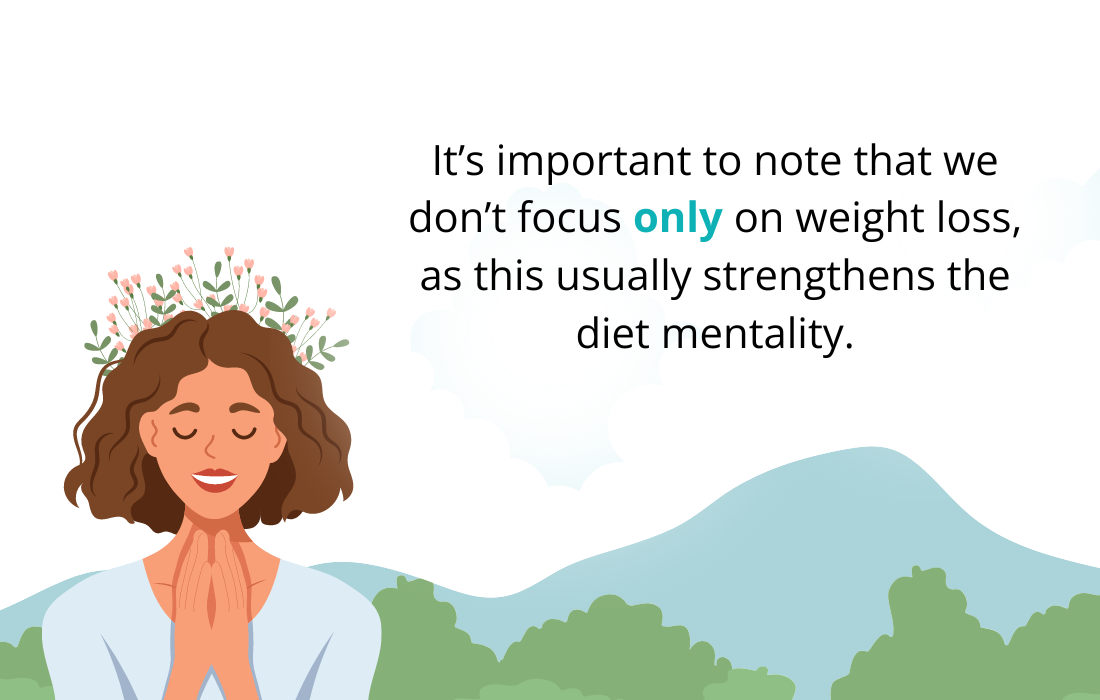
How I Approach Intuitive Eating for Weight Loss
I take a four pronged approach to holistic weight loss: physical, mental, emotional and spiritual.
Some of the women I work with focus only on stopping bingeing and emotional eating. Others want to talk more specifically about approaching weight loss in a sustainable way.
There are many topics that influence weight and we tackle the issues that diets simply do not: rebalancing the body, letting go of the diet mentality, learning hunger and fullness, understanding how to deal with life, stress and emotions without eating, self-care and nourishment, body acceptance and other complex topics that involve weight.
My intention is always to guide my clients to become intuitive eaters–learning to trust in their own decisions around food and feel in control.
Isn’t Intuitive Eating Just Another Diet?
No, intuitive eating is not meant to be a diet.
Unlike traditional diets that rely on external rules and restrictions, intuitive eating is about listening to your body and honoring its needs without judgment or guilt. There is no restriction, deprivation or hating ourselves into change.
Causes of Weight Gain and How Intuitive Eating Can Help
Weight gain can be influenced by a variety of factors, including genetics, environment, and lifestyle.
Intuitive eating addresses the underlying causes of weight gain by not only looking at food choices but at our mindset, how we handle stress and other emotions, self-sabotage, limiting beliefs, self-care, the all or nothing mindset, and any other mental, emotional or spiritual aspect that impacts weight.
Main Principles of Intuitive Eating
There is more than one key to intuitive eating.
main principles of intuitive eating include rejecting the diet mentality, honoring your hunger and fullness cues, making peace with food, challenging food rules, finding satisfaction in eating, coping with emotions without food, respecting your body, exercising for well-being, and prioritizing health.

How to Practice Intuitive Eating
Practicing intuitive eating involves tuning into your body’s hunger and fullness cues, eating mindfully, and making food choices that nourish your body and soul.
For all women I work with, we typically begin with eating every 3-4 hours so that we can develop a regular rhythm and routine fueling the body. From there, it’s easier to begin understanding what foods give you energy, how long certain foods keep you fueled, where you need more or less food, and using the steady cadence of eating as the jumping off point to learn your body’s signals.
How to Create an Effective Intuitive Eating Plan
Creating an effective intuitive eating plan isn’t that complex.
It involves setting realistic goals, identifying your triggers and challenges, and finding strategies that work for you.
Yes, You Might Gain Weight When You First Start Intuitive Eating
It’s important to remember that weight fluctuations are normal and may occur when you first start practicing intuitive eating.
This happens especially if we’ve been dieting for a long time. The body typically has a rebalancing period, where it’s learning to trust again and re-balancing itself from years spent in the diet cycle.
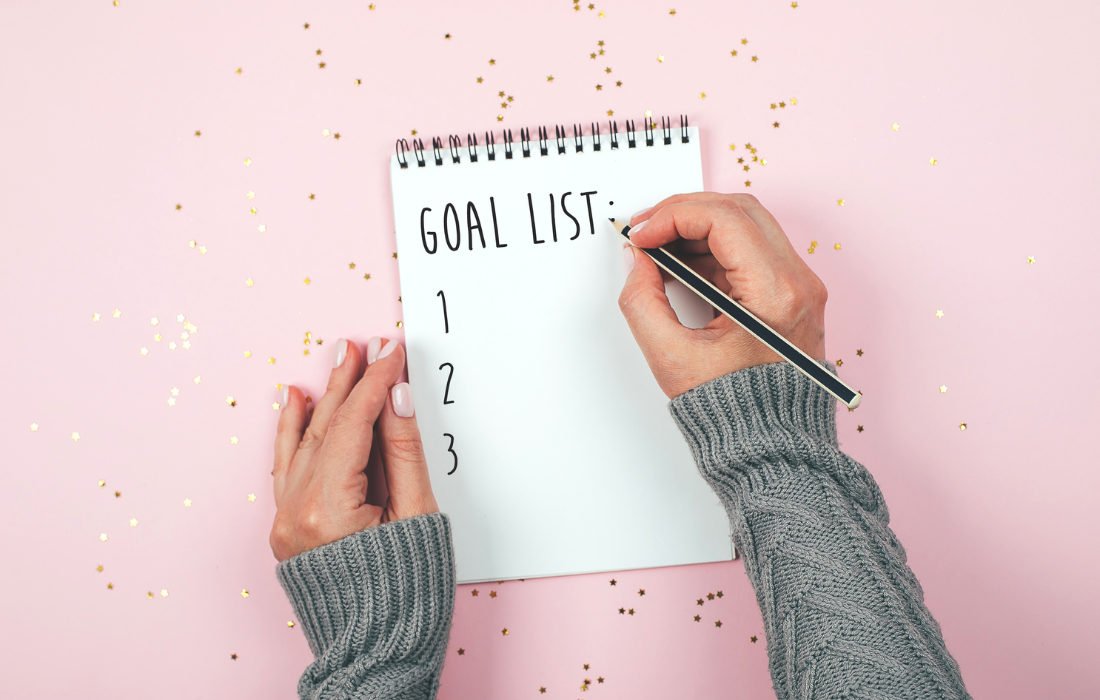
Hybrid Intuitive Eating: Structure + Your Intuition
I take a hybrid approach to intuitive eating.
Many women get very confused when left to their own devices to “just listen to their body.” After years spent immersed in rules and diets, we don’t know HOW to listen to our bodies. I begin with a blend of structure that integrates into the “intuitive” aspect of intuitive eating.
Some women need more structure and others need more permission–it’s all about exploring your own history to understand what you need and what will work for you.
10 Simple Steps for Intuitive Eating
1 – Reject the Diet Mentality
Can you entertain the idea that foods aren’t “good” or “bad” but neutral?
Changing language to describe a food as more or less nourishing, more or less energizing, or more or less nutritious helps shift out of the diet mentality. This softening helps to focus on nourishing your body and satisfying your cravings in a balanced way. It also helps you get out of the “food police” mentality (and criticizing yourself for not eating only “good” foods.)
2 – Recognize Hunger Cues
Get to know your body!
Learn to tune into your body’s signals of hunger and try to eat when you’re physically hungry, rather than based on external cues or emotions. Hearing hunger signals can take some practice, but begin tuning into sensations of what hunger feels like in your body.
3 – Make Peace with Food
Give yourself permission to enjoy all foods without guilt or judgment.
Allow yourself to savor your favorite treats in moderation, knowing that no food is off-limits. This is an approach of balance and sustainability, not short term “results!”
4 – Challenge Food Rules
Question the restrictive rules and beliefs you may have about food, and challenge yourself to break free from rigid eating patterns.
We pick up so much baggage in the diet world and this is a chance to let it go to learn what works for YOUR body.
5 – Honor Fullness Cues
It’s important to honor your body’s fullness cues!
Pay attention to your body’s signals of fullness and see if you can stop eating when you feel satisfied, rather than continuing to eat out of habit or obligation. This can take time, as its a learning (or re-learning) what those subtle sensations feel like!
6 – Find Satisfaction in Eating
Eat to satisfy! This is a new approach when we break free from dieting.
Explore foods that satisfy you both physically and emotionally. Choose foods that you enjoy and that make you feel good, rather than simply focusing on calories or macros.
7 – Cope with Emotions without Food
It’s absolutely possible to cope with emotions without food.
Develop alternative coping mechanisms for dealing with stress, boredom, or other emotions that don’t involve food. Some of my favorites include journaling, meditation, yoga, art journaling, EFT or tapping and walks in nature.
8 – Respect Your Body
We can never hate ourselves into change.
See if you can cultivate kindness and compassion for yourself and your body, no matter what its size or shape. Remember that this is one point in time in your journey–your body can still change (and kindness unlocks the space for it TO change.)
9 – Exercise for Well-being
Engage in physical activity that you enjoy and that makes you feel good.
Rather than viewing exercise solely as a means of burning calories or losing weight, think of at as something you do for yourself to feel good. What movements did you enjoy as a kid? What would feel fun rather than punishing? Start there!
10 – Prioritize Health with Intuitive Eating
Shift your focus from weight loss to overall health and well-being.
I always encourage clients to focus on health and the weight will take care of itself over time. Make choices that support your physical and mental health, and trust that your body will naturally settle at its healthiest weight when you prioritize self-care and nourishment.
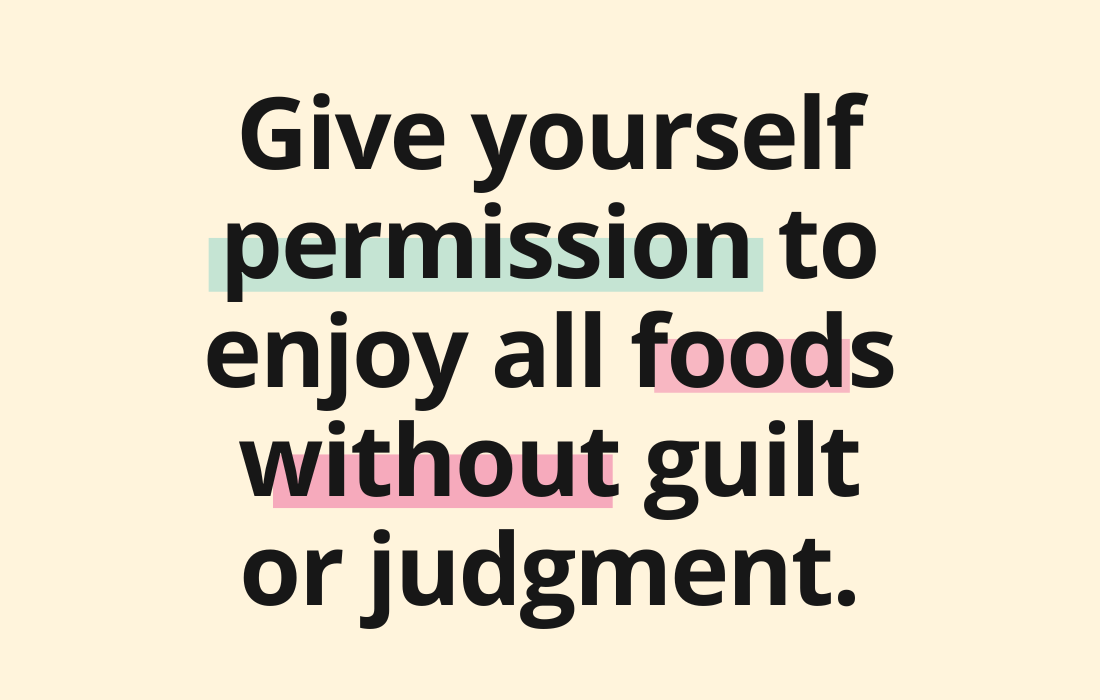
How Body Acceptance Plays into Intuitive Eating
Body acceptance is a key component of intuitive eating, as it involves embracing and respecting your body at any size or shape.
We pick up a lot of baggage in society about ideal body standards and what we are “supposed” to look like. Instead of striving for an idealized image or comparing yourself to unrealistic standards, intuitive eating encourages you to appreciate your body for all that it is capable of.
By cultivating body kindness and practicing compassion, you can develop a deeper connection with your body and feel inspired to take care of it, rather than punish it. Through body acceptance, intuitive eating becomes a journey of self-discovery and self-love, allowing you to find peace and contentment in your own skin.
How Intuitive Eating Can Help You Stop Emotional Eating
Emotional eating often arises as a response to stress, boredom, or other emotions, leading to overeating as a way to cope with feelings we don’t know how to deal with.
Intuitive eating provides a holistic approach to addressing emotional eating by encouraging self-awareness and mindfulness. Having typically been immersed in the diet world, we don’t ever learn what to do to cope with life without food.
By learning to tune into your body’s hunger and fullness cues, you can differentiate between physical and emotional hunger, allowing you to respond to your emotions in ways that better serve you. Through intuitive eating, you can develop alternative coping mechanisms for dealing with stress or other emotions, such as journaling, meditation, tapping, yoga, getting support, etc.
Is Intuitive Eating a Good Way to Stop Yo-Yo Dieting?
Yes, intuitive eating enables you to get out of the yo-yo diet cycle as it’s not a diet.
By learning to listen to your body’s cues and prioritizing self-care, intuitive eating helps break the cycle of restrictive dieting and overeating by taking a holistic focus and healing the underlying causes of why we use food other than for physical hunger.

Will Intuitive Eating Stop the Binge and Restrict Cycle?
By tuning into your body’s hunger and fullness cues, intuitive eating helps prevent episodes of overeating and bingeing, while also reducing feelings of deprivation that lead to restriction.
Intuitive eating helps women break free from the harmful cycle of bingeing and restricting, as there is no deprivation. This restriction is one of the main causes of bingeing and instead of swinging back and forth between the extremes, intuitive eating aims for balance.
Alternatives to Intuitive Eating for Weight Loss
Other alternatives to intuitive eating for weight loss include mindful eating, which emphasizes being present and aware while eating to enhance the eating experience and promote healthier food choices.
Additionally, intuitive meal planning focuses on planning meals based on hunger cues and nutritional needs rather than strict calorie counting or portion control. Some individuals also explore the Health at Every Size (HAES) approach, which shifts the focus away from weight loss and emphasizes health-promoting behaviors regardless of body size.
There is also a blend of approaches depending on what each person needs! It’s important to find what works for you and resonates with your beliefs and desires.
Should You Work with an Intuitive Eating Counselor or Coach?
Working with a coach can provide you with the support, guidance, and accountability you need to successfully navigate your intuitive eating journey.
1:1 work is the fastest way to get what we want. If you are feeling stuck or feel like you aren’t making sustainable progress, explore counselors or coaches that have an approach you resonate with.
A coach may be a certified intuitive eating counselor or not, but the important part is that they have lived the journey themselves. Having someone who’s walked this path before you will be immensely helpful in your own journey.
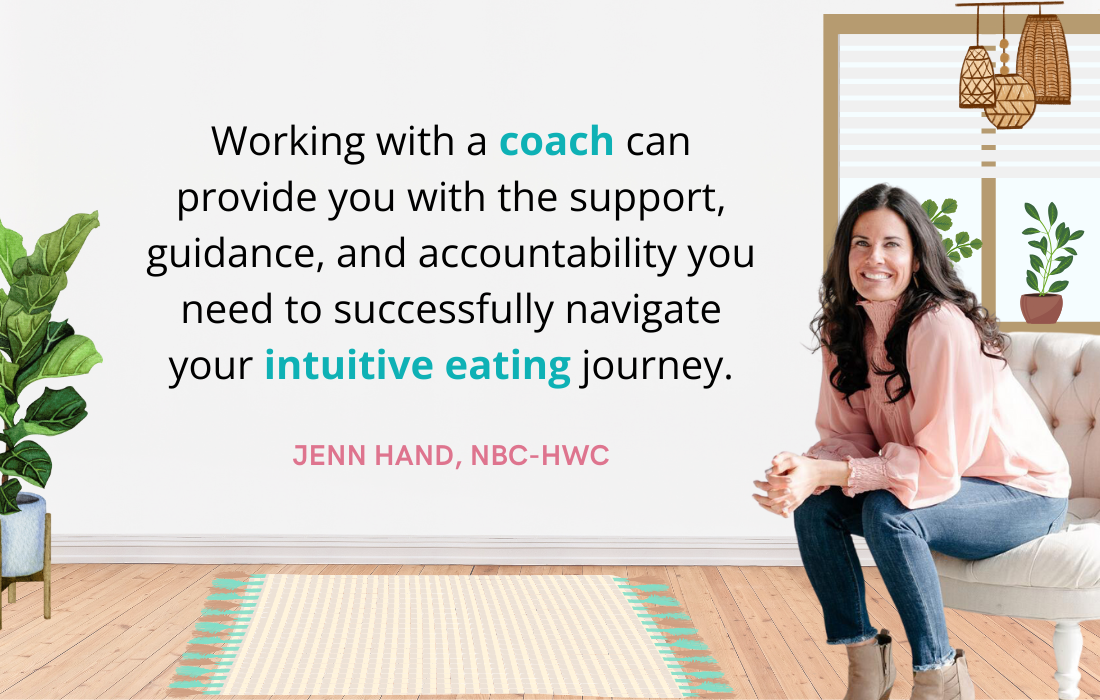
Common Questions about Intuitive Eating for Weight Loss
How do I let go of my desire for weight loss? And do I have to?
It can be challenging to let go of wanting weight loss.
It’s something I struggled with often on my own journey. Think of it not as a giving up, but a shifting focus towards health and well-being vs pounds lost. You can still want to lose weight, we just focus more so on health rather than pounds lost.
Does intuitive eating work for obesity?
Intuitive eating can be effective for individuals with obesity by promoting a healthier relationship with food and supporting sustainable weight management practices.
What are the side effects of intuitive eating?
Side effects of intuitive eating may include initial weight fluctuations.
As well as emotional challenges related to breaking free from dieting mentality and learning to deal with life without food. As the body rebalances over time, these typically subside.
Is intuitive eating really healthy?
Intuitive eating is generally considered healthy as it emphasizes nourishing your body, respecting its signals, and fostering a positive relationship with food.
This approach doesn’t mean that we sit around and eat ice cream all day–it’s meant to understand how nutrition and permission both fit into an overall healthy way of eating!
Why am I gaining weight with intuitive eating?
Weight gain with intuitive eating can occur initially as the body adjusts to a new way of eating, but it tends to stabilize over time as individuals learn to trust their body’s signals and make balanced food choices.
What are the common pitfalls of intuitive eating?
The most common pitfalls include misinterpreting hunger cues, struggling to not emotionally eat, and battling societal messages about food and body image.
Additionally, those who struggle with eating disorders may not be ready for this way of eating just yet.
Some healing may be required before it feels more natural to dive into this approach. If you do struggle with disordered eating, it may better serve you to find some balance first and then explore intuitive eating.
How long does it take to lose weight with intuitive eating?
The timeline for weight loss with intuitive eating varies for each individual and depends on many different things: genetics, hormones, movement, stress, sleep metabolism, and lifestyle habits. It’s important to prioritize health and well-being over rapid weight loss.
Is intuitive eating better than intermittent fasting?
Intuitive eating and intermittent fasting are completely different approaches.
For most women who’ve struggled with food, intermittent fasting usually causes bingeing. I don’t recommend it if you’ve struggled with dieting/bingeing.
Typically those trying intermittent fasting are actively pursuing weight loss, which can make it challenging to keep weight off long term.
Most people can’t sustain fasting for a long period, so it may be better to find an approach that resonates more with your lifestyle!
What are the criticisms of intuitive eating?
Intuitive eating can be challenging if we don’t have guidance, as many women have years of diets, calorie and macro counts, and “shoulds” in their head around food. Others criticize it for a lack of structure and difficulty in adhering to the main principles.
How often should you eat intuitively?
There are no strict rules about how often to eat intuitively.
It’s about tuning into your body’s hunger and fullness cues and eating when you’re physically hungry, regardless of the time of day. In my hybrid approach, we begin eating every 3-4 hours to use that as the foundation to learn the body’s signals.
Can I eat whatever I want on intuitive eating?
Yes, intuitive eating encourages eating all foods in moderation and trusting your body to guide your food choices based on its needs and preferences. It’s about finding a balance that supports both physical and emotional well-being.
Have any of your clients lost weight with this approach?
Yes 🙂 Some of the women I work with aren’t focused at all on weight–and that’s okay.
Others are working to find a sustainable way of eating that allows them to release weight. Again, it’s all about focusing not on “eating for a result” (weight loss) but on a long term way of eating for health!
Related Articles
⚪Yo-Yo Dieting and Weight Loss: What It Is, Effects, and How to Stop
⚪ How To Deal With Food Guilt In Recovery
⚪ How Diets Play a Role in Emotional Eating
Get the Normal Eater’s Newsletter
Join 8000+ women who are overcoming overeating, binge eating, and breaking up with dieting forever. Get Jenn’s inspiring and actionable weekly newsletter with the latest posts, podcasts, and tips on how to love your body, find food freedom, and lose weight holistically.
Get the Normal Eater’s NewsletterWork with an Emotional Eating & Holistic Nutrition Coach
Overcome Bingeing and Emotional Eating, and Break Up with Yo-yo Dieting
Working with an emotional eating coach and holistic nutritionist can help you get free from the frustrating binge and restrict cycle and stop yo-yo dieting.
You don’t have to be obsessed with food or have a million rules around eating to find your natural weight and learn to love your body. Ready to actually see a lasting change and experience true freedom?
Schedule a 20-min CallAbout the Author:
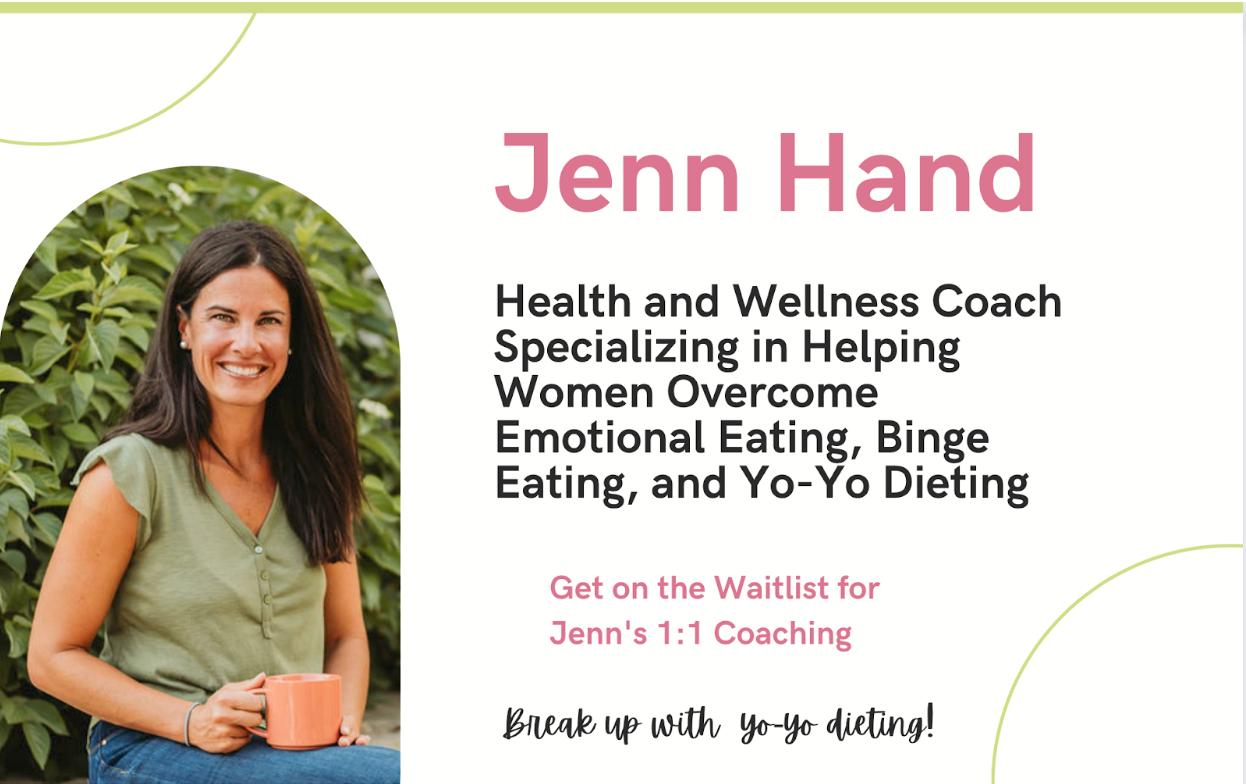
Jenn Hand has been helping women like you become normal eaters since 2015.
She’s worked with thousands of women, helping them to balance their bodies, end bingeing, stop obsessing over food, and start feeling amazing again. As a board-certified health coach and holistic nutritionist, Jenn knows how to support you in making real positive changes that last.
Her articles have been published on Mind Body Green, Tiny Buddha, Thrive Global and other local and global media platforms. She’s the author of How to Be a Normal Eater and the creator of The Normal Eater’s Club program. Listen to Jenn’s advice and tips on the Cake Doesn’t Count Podcast, or read more of her articles for free on the Food Freedom Blog.
Learn About Coaching!
